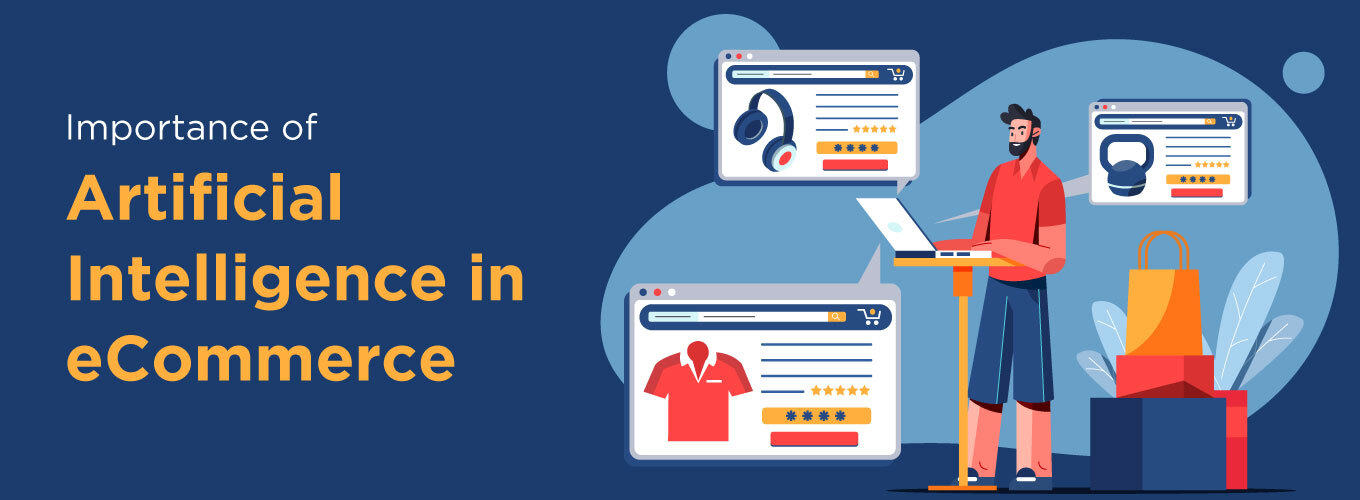Artificial Intelligence is transforming the e-commerce industry by enhancing customer experiences and enabling data-driven decisions. From personalized recommendations to intelligent marketing strategies, AI seamlessly integrates into online shopping. The post-pandemic surge in e-commerce has accelerated the adoption of AI, helping brands predict consumer preferences and optimize engagement.
AI-driven personalization refines marketing efforts based on browsing behavior and purchase history, making shopping more convenient and efficient. Many consumers benefit from AI without even realizing it. A report by Accenture highlights that 91% of shoppers prefer brands that offer personalized recommendations, showcasing AI’s growing influence in e-commerce.
In this article, we will explore how AI is reshaping e-commerce, its key applications, and the future of AI-driven online shopping.
How AI is Transforming E-commerce
Artificial Intelligence (AI) is revolutionizing e-commerce by enhancing customer experiences, automating processes, and improving operational efficiency. Below are key ways AI is being utilized in the e-commerce sector:
1. Chatbots and Virtual Assistants
AI-powered chatbots and virtual assistants use language processing and machine learning to understand customer queries and provide immediate support. Available 24/7, these assistants handle a variety of tasks, from product research to managing inventory. Additionally, AI-driven assistants can process voice-based interactions, gaining insights into customer needs and preferences to enhance the service.

2. Smart Search
Finding the right product on an e-commerce website can be challenging, but AI-enabled “smart search” improves product discovery. By combining advanced search techniques and merchandising, this “searchandising” approach makes it easier to locate desired products. AI also suggests product recommendations based on browsing history or previous purchases, enhancing the shopping experience.
3. Personalization
AI enables e-commerce platforms to offer a highly personalized experience by tailoring product recommendations based on individual preferences, browsing behavior, and past purchases. Personalized suggestions can prompt impulse buys and drive additional sales. AI also powers cross-selling and upselling by recommending complementary products to customers during checkout.
4. Automation
AI streamlines e-commerce operations by automating customer support and other routine tasks. By handling repetitive queries and integrating both front and back-end workflows, AI saves time, reduces operational costs, and improves efficiency. It can also identify high-risk transactions and offer discounts to loyal customers while only escalating complex issues to human agents.

5. Remarketing
Remarketing uses AI to re-engage potential buyers who may have abandoned their shopping carts. By sending personalized push notifications based on purchase history or browsing patterns, AI draws customers back to complete their purchases, boosting conversion rates. These targeted reminders help drive repeat business by keeping the brand top of mind.
6. Dynamic Pricing & Demand Forecasting
AI aids in dynamic pricing by analyzing data and suggesting optimal pricing strategies and discounts. It also assists in demand forecasting, helping businesses anticipate shifts in consumer demand and adjust inventory levels or marketing efforts accordingly. AI-driven consumer analytics ensure better-targeted marketing and improved pricing models.

With these capabilities, AI is not just a tool but a critical driver of success in e-commerce, enhancing customer engagement, boosting sales, and improving business performance.
Effective Steps to Implement AI in E-commerce
Integrating AI into e-commerce can boost customer experience, optimize pricing, streamline operations, and increase sales. Follow these straightforward steps to get started:
- Set Clear Goals: Start by defining your business objectives and challenges to understand what you want to achieve with AI. Whether it’s increasing sales or improving customer support, knowing your goals will guide your next steps.
- Gather the Right Data: Identify the key data sources that will feed into your AI system. This includes customer purchase data, product details, and market trends. Good data is the foundation for successful AI implementation.
- Pick the Best AI Tool: Choose an AI solution that fits your specific business needs. Whether it’s for personalized recommendations, pricing optimization, or inventory management, selecting the right tool is essential for success.
- Clean and Organize Your Data: Before using your data for analysis, ensure it’s accurate, well-organized, and clean. This step ensures that the AI model works efficiently and provides accurate predictions.
- Train the AI System: Feed your data into the AI model and allow it to learn patterns and generate insights. This process helps the system make smarter decisions and predictions to drive your business forward.
- Test and Tweak: Once the model is trained, run tests to check its performance. Compare results to traditional methods and make necessary adjustments to ensure everything works as intended.
- Deploy AI Across Channels: Integrate your AI solution into your e-commerce platform. This could involve adding it to your website, app, or customer support channels to enhance the customer experience.
- Track and Improve: After deployment, continuously monitor the system’s performance. Analyze customer feedback and sales data to fine-tune the AI for even better results.
Benefits of Implementing AI in E-commerce
Here are some of the key benefits of implementing Artificial Intelligence in e-commerce.
- Optimized Pricing: AI enables dynamic pricing by analyzing real-time market conditions, ensuring businesses stay competitive while maximizing profits.
- Personalized Shopping Experience: AI tailors product recommendations and promotions based on customer behavior, improving engagement and boosting sales.
- Smarter Search Functionality: AI enhances search accuracy by understanding natural language, fixing errors, and improving product discovery for users.
- Efficient Customer Support: AI-powered chatbots provide 24/7 support, handling common queries and freeing up human agents for complex issues.
- Advanced Fraud Prevention: AI detects suspicious transactions in real-time, helping e-commerce platforms minimize fraud and protect customer data.
Conclusion
AI has truly transformed the e-commerce landscape by reshaping how websites showcase and sell products. By leveraging the vast amounts of data AI generates, businesses can make data-driven decisions, accurately predict future trends, and adapt their marketing and pricing strategies for optimal performance. This technological advancement not only enhances customer experiences but also provides businesses with a competitive edge, ensuring sustained growth and efficiency in an increasingly dynamic market.


